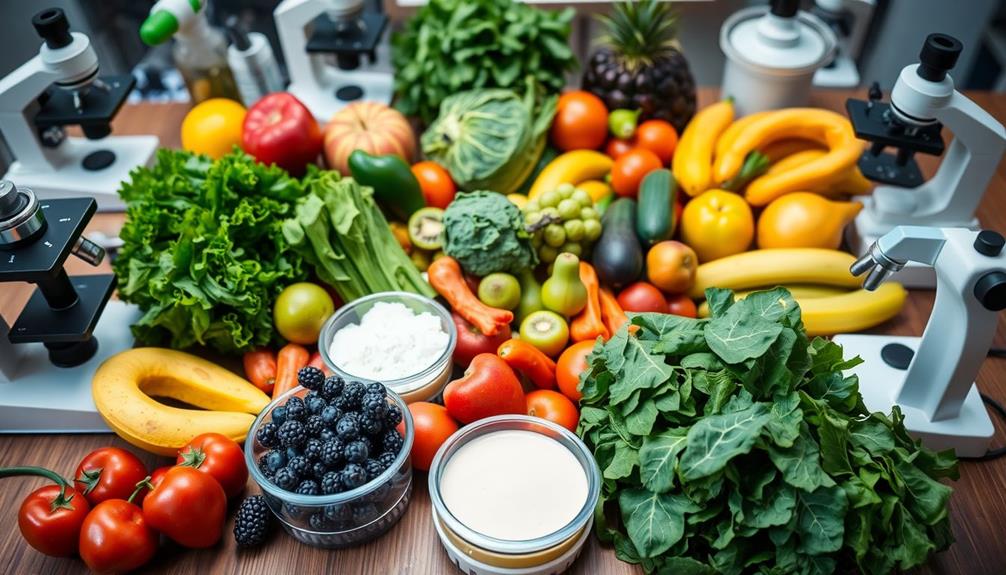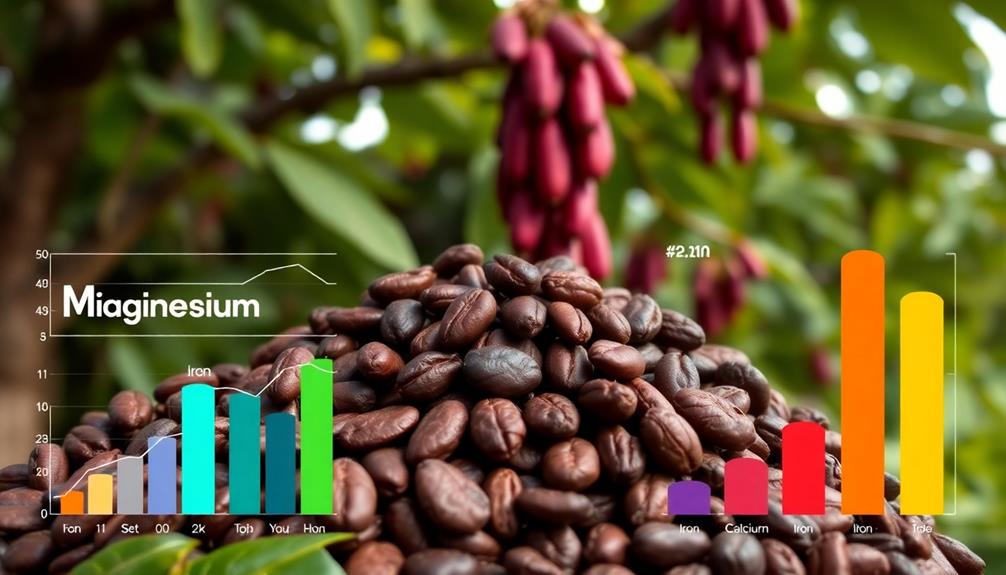The Raw Food Diet can yield benefits like weight loss and improved heart health, thanks to increased consumption of fruits and vegetables. However, it also carries significant nutritional risks, such as deficiencies in vitamin B12 and omega-3 fatty acids. You might notice lower cholesterol levels, but some followers experience bone density issues and inadequate caloric intake. Experts warn that relying solely on raw foods may not provide a balanced and sustainable diet. If you're curious about balancing raw foods with cooked options, you'll find valuable insights just ahead.
Key Takeaways
- The raw food diet may lead to weight loss and lower LDL cholesterol levels, indicating potential cardiovascular benefits.
- Nutritional deficiencies, particularly in vitamin B12 and omega-3 fatty acids, are common among raw food followers.
- Cooking enhances nutrient availability, challenging the idea that raw foods are always nutritionally superior.
- The restrictive nature of the diet can lead to inadequate caloric intake and potential health risks over time.
- A balanced approach, incorporating both raw and cooked foods, is recommended for optimal health benefits.
Overview of the Raw Food Diet
Embracing the Raw Food Diet means focusing on uncooked, unprocessed plant-based foods, with temperatures not exceeding 118°F (48°C). This diet originated in the mid-1970s and primarily includes fruits, vegetables, nuts, seeds, and sprouted grains.
While many followers identify as vegan, some variations incorporate raw animal products like fish or dairy. Advocates of the raw food diet often tout benefits such as increased energy levels, weight loss, and improved overall health. They believe that the retention of nutrients and enzymes in uncooked foods enhances these positive effects, similar to how celery juice contributes to digestive health.
However, the diet's restrictive nature raises concerns about potential nutritional deficiencies. One major issue is the lack of vitamin B12, which is primarily found in animal products. This deficiency can lead to serious health problems over time.
Additionally, omega-3 fatty acids, essential for brain and heart health, are often insufficient in a strictly raw plant-based diet. While you may experience short-term benefits from weight loss and heightened energy, it's important to take into account these potential drawbacks before committing to the raw food lifestyle.
Balancing your nutrient intake is fundamental for long-term well-being.
Scientific Evidence and Findings

Scientific research provides valuable insights into the effects of the raw food diet on health. Studies suggest that raw-foodists tend to have lower LDL cholesterol levels, which could indicate cardiovascular benefits. However, this diet's restrictive nature raises concerns about nutrient deficiencies.
For instance, those following a raw food diet should consider natural remedies alongside conventional medications to guarantee they address potential health issues effectively. Research shows that 38% of raw-food followers are deficient in vitamin B12, a vital nutrient for heart health, leading to significant health risks.
Additionally, while raw-foodists often have lower body mass indices, they may also experience lower bone densities, increasing the risk of osteoporosis. The scientific evidence supporting claims about enzyme preservation and toxin reduction in raw foods is limited.
In fact, many nutrients are more bioavailable when cooked, challenging the raw food diet's assertions about nutritional completeness. Moreover, deficiencies in omega-3 fatty acids can occur, further complicating the diet's health implications.
Expert Opinions and Evaluations

While many people may be drawn to the raw food diet for its perceived health benefits, experts widely criticize its sustainability and nutritional adequacy. They point out that raw food diets often lead to significant nutritional inadequacy, resulting in deficiencies of essential nutrients like vitamin B12, vitamin D, iron, calcium, and omega-3 fatty acids.
This restrictive nature raises concerns, especially regarding heart health and diabetes management. Additionally, diversification strategy in diet is essential, as incorporating a variety of food groups can enhance overall well-being.
Moreover, scientific evidence suggests that cooking enhances nutrients, contradicting the belief that raw foods are always superior. While increasing your intake of raw fruits and vegetables can be beneficial, experts advocate for a balanced approach that includes both raw and cooked foods to optimize health.
The raw food diet is also deemed not family-friendly and poses challenges in social situations, which can hinder long-term adherence. Many find it difficult to maintain such a restrictive regimen when faced with everyday dining scenarios.
Ultimately, expert opinions suggest that a more flexible diet may better support your nutritional needs and lifestyle, enabling you to enjoy a wider variety of foods while still reaping health benefits.
Health Benefits and Risks

The raw food diet promises a mix of health benefits and risks that can impact your overall well-being. On the positive side, studies suggest that this diet can lead to reduced LDL cholesterol levels and effective weight management, with raw food eaters often enjoying lower body mass indices. Increased consumption of vegetables and fruits enhances your nutrient intake, which is certainly beneficial. On the other hand, the raw food diet may also pose potential risks, such as reduced iron levels due to limited intake of meat and decreased protein intake overall. Additionally, some experts question whether the diet provides all necessary nutrients for long-term health. However, it is important to note that while a raw food diet may have health benefits, it is not a cure-all. Can raw food cure arthritis? This is a common question, but there is no conclusive evidence to suggest that a raw food diet can cure arthritis. It may help manage symptoms for some individuals, but it is important to consult with a healthcare professional for personalized advice.
Additionally, incorporating regular physical activity can further support the positive impacts of a raw food diet on health. However, there are significant health risks and benefits to evaluate. A major concern is the potential for nutrient deficiencies, particularly in vitamin B12 and omega-3 fatty acids. Research shows that 38% of raw foodists may have B12 deficiencies, which are vital for heart health.
Additionally, raw food eaters might face lower bone densities, raising concerns about osteoporosis and long-term bone health. Elevated homocysteine levels were found in 50% of raw food participants, linking them to cardiovascular risks as well.
The restrictive nature of the raw food diet can also lead to inadequate caloric intake, compounding these health risks. While the diet's emphasis on fresh produce is laudable, it's important to weigh these potential benefits against the risks involved for your overall health.
Practical Considerations and Tips

Beginning a raw food diet can be both exciting and challenging. One of the key practical considerations is your grocery budget, as you'll likely rely on organic ingredients, which can increase costs. To manage this, consider buying in bulk and using coupons, especially for seasonal produce, which tends to be cheaper and fresher.
Additionally, be aware of the health considerations associated with your diet, as some raw food choices can be high in sugar and fat, similar to ice cream's health impact.
Preparation time is another factor to keep in mind. Many raw meals require chopping, soaking, or sprouting, so it's crucial to plan your schedule accordingly. If you have a busy lifestyle, try meal prepping on the weekends to make weekday eating easier.
When dining out, your options might be limited. Research restaurants with raw or vegan offerings ahead of time to avoid frustration.
Engaging with online communities can also be a great source of support. You'll find tips and recipes that can make your journey smoother.
Additionally, maintaining a food diary can help you track your meals and guarantee you're getting a balanced intake of nutrients. By being mindful of these practical aspects, you'll set yourself up for a more successful raw food diet experience.
Frequently Asked Questions
Is the Raw Food Diet Scientifically Proven?
The raw food diet isn't scientifically proven. While some studies show benefits, many claim significant nutrient deficiencies exist. It's crucial to contemplate a balanced diet that includes both raw and cooked foods for better health.
What Do Doctors Say About the Raw Food Diet?
Doctors warn you about the raw food diet's potential nutritional inadequacies. They highlight risks like deficiencies and low energy. A balanced approach, combining raw and cooked foods, is generally suggested for ideal health and sustainability.
What Are the Results of the Mostly Raw Food Diet?
The mostly raw food diet shows lower BMIs and LDL cholesterol levels, but it can lead to nutrient deficiencies, especially in protein and calcium. You might consume plenty of fruits and vegetables, yet still face risks.
Why Are so Many Vets Against Raw Diet?
Many vets oppose raw diets because they can cause nutrient imbalances, increase bacterial contamination risks, lead to gastrointestinal issues, and often fail to meet pets' caloric needs. They recommend scientifically formulated pet food instead.
Conclusion
In summary, while the raw food diet might promise you superhero-like energy and a body that glows brighter than the sun, it's essential to approach it with a sprinkle of caution. Sure, you might feel lighter than air after a week of kale and carrots, but don't forget the risks lurking in the shadows. Balance is key, so blend those veggies with some sensible eating habits, and you'll be on the path to health without turning into a rabbit!

















